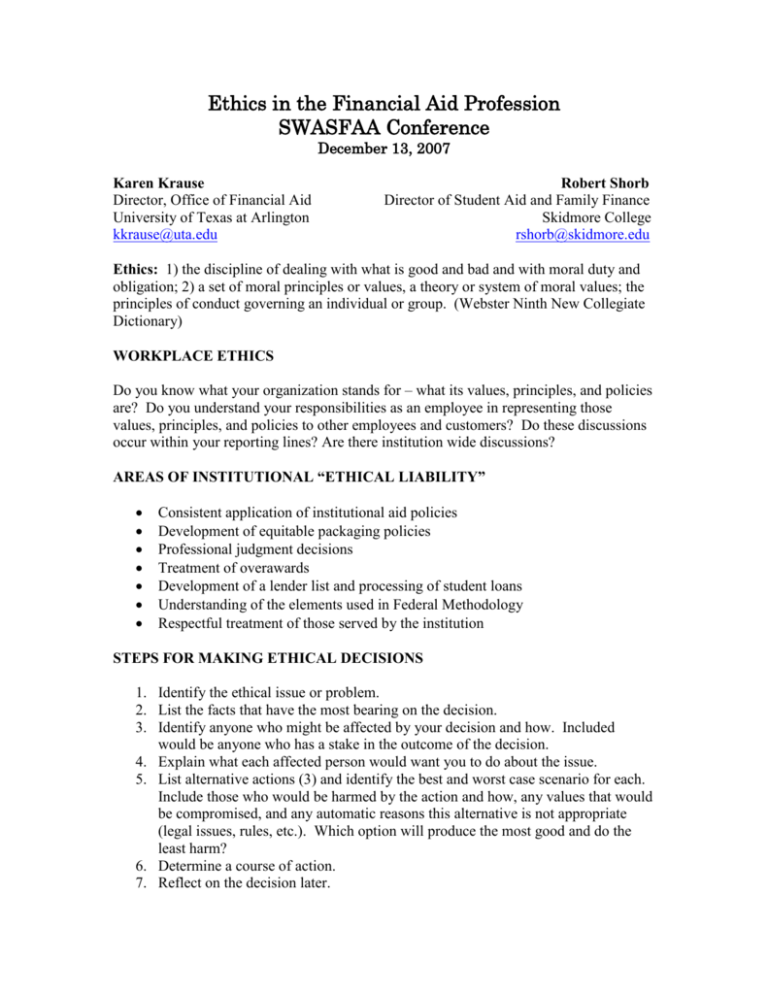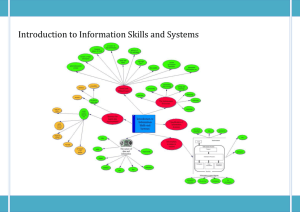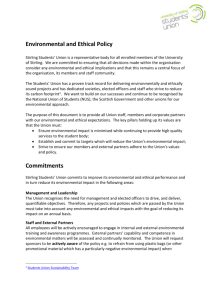Ethics in the Financial Aid Office
advertisement

Ethics in the Financial Aid Profession SWASFAA Conference December 13, 2007 Karen Krause Director, Office of Financial Aid University of Texas at Arlington kkrause@uta.edu Robert Shorb Director of Student Aid and Family Finance Skidmore College rshorb@skidmore.edu Ethics: 1) the discipline of dealing with what is good and bad and with moral duty and obligation; 2) a set of moral principles or values, a theory or system of moral values; the principles of conduct governing an individual or group. (Webster Ninth New Collegiate Dictionary) WORKPLACE ETHICS Do you know what your organization stands for – what its values, principles, and policies are? Do you understand your responsibilities as an employee in representing those values, principles, and policies to other employees and customers? Do these discussions occur within your reporting lines? Are there institution wide discussions? AREAS OF INSTITUTIONAL “ETHICAL LIABILITY” Consistent application of institutional aid policies Development of equitable packaging policies Professional judgment decisions Treatment of overawards Development of a lender list and processing of student loans Understanding of the elements used in Federal Methodology Respectful treatment of those served by the institution STEPS FOR MAKING ETHICAL DECISIONS 1. Identify the ethical issue or problem. 2. List the facts that have the most bearing on the decision. 3. Identify anyone who might be affected by your decision and how. Included would be anyone who has a stake in the outcome of the decision. 4. Explain what each affected person would want you to do about the issue. 5. List alternative actions (3) and identify the best and worst case scenario for each. Include those who would be harmed by the action and how, any values that would be compromised, and any automatic reasons this alternative is not appropriate (legal issues, rules, etc.). Which option will produce the most good and do the least harm? 6. Determine a course of action. 7. Reflect on the decision later. NASFAA STATEMENT OF ETHICAL PRINCIPLES The primary goal of the financial aid professional is to help students achieve their educational potential by providing appropriate financial resources. To this end, this Statement provides the Financial Aid Professional with a set of principles that serves as a common foundation for accepted standards of conduct. The Financial Aid Professional shall: 1. Be committed to removing financial barriers for those who wish to pursue postsecondary learning. 2. Make every effort to assist students with financial need. 3. Be aware of the issues affecting students and advocate their interests at the institutional, state, and federal levels. 4. Support efforts to encourage students, as early as the elementary grades, to aspire to and plan for education beyond high school. 5. Educate students and families through quality consumer information. 6. Respect the dignity and protect the privacy of students, and ensure the confidentiality of student records and personal circumstances. 7. Ensure equity by applying all need analysis formulas consistently across the institution's full population of student financial aid applicants. 8. Provide services that do not discriminate on the basis of race, gender, ethnicity, sexual orientation, religion, disability, age, or economic status. 9. Recognize the need for professional development and continuing education opportunities. 10. Promote the free expression of ideas and opinions, and foster respect for diverse viewpoints within the profession. 11. Commit to the highest level of ethical behavior and refrain from conflict of interest or the perception thereof. 12. Maintain the highest level of professionalism, reflecting a commitment to the goals of the National Association of Student Financial Aid Administrators. Adopted April 1999 http://www.nasfaa.org/subhomes/MediaCenter/NASFAACodeofConduct.pdf Scenario #1 – Professional judgment You have 2 students who have contacted you about similar changes in their financial situations. George is president of the student government association with a 3.87 grade point average. Kimberly has complained to your boss about your office in the past and has a 2.1 grade point average. 1. 2. 3. 4. 5. Do you make professional judgment decisions in your office? How do you publicize the availability of a change in circumstances and special conditions? Do you have situations that typically trigger a professional judgment review? Are you consistent in your application of professional judgment? Would these two students be treated in the same manner? Scenario #2 – Non-custodial Parent Sally needs help completing her FAFSA for the first time. She is a high school senior who plans to attend your university. Her parents are divorced and she lives with her mother and two younger brothers. Her father is a wealthy physician and makes regular child support payments, but this support when combined with her mother’s income totals only $25,000 per year. 1. 2. 3. 4. Do you request non-custodial parent information on this student? Do you request such information on all students with divorces parents? If so, how do you use such information? Does it make a difference if the father indicates that he will provide support by paying all or a portion of Sally’s tuition and fees? If the father wasn’t perceived as “wealthy” would you treat the student differently? Do you have consistent policies for handling this situation? Scenario #3 – Overawards Mary’s financial aid package was completed in April that met her financial need. In September, you were notified that she received a $1,000 scholarship from a local civic club. The scholarship has created an overaward for her. 1. 2. Do you explore the possibility of increasing her cost of attendance to resolve the overaward? If so, to what degree of effort? 3. 4. 5. 6. If you actively attempt to increase the budget to resolve the overaward, do you attempt to increase the budget if you had been notified of the additional award before the aid was packaged? If not, does this create an ethical issue? What if you didn’t receive the scholarship notification until the following February? Are your policies to handle overawards written? Do you consistently apply your written policies? Scenario #4 – Outside Request John is attending your University and is not eligible for federal grants. He is a good student but not at the top of his class. A state senator (or university Board of Regents member) contacts you with a request to “do what you can for this student”. 1. 2. 3. 4. How do you handle this situation? What options do you explore in terms of cost of attendance and EFC? Is institutional aid an option? What happens when your Vice President gets involved and asks you to “see the bigger picture”? Work Ethic Guidelines Trustworthiness Work scheduled hours. Arrive at the job site on time. Provide honest feedback on progress and problems. Work with little supervision, yet seek guidance as needed. Give proper notice of anticipated absences, Keep confidences, never reveal proprietary information and honor a person's right to privacy. Be honest, reliable and ethical in all business dealings. Refuse to steal, misuse or abuse company time, property or equipment. Refuse to lie, cheat, deceive, manipulate, exploit or take advantage of others. Build confidence between employer, employees, vendors and customers. Respect Treat supervisors, co-workers, vendors and customers with courtesy, honor and respect. Build mutual respect and long-term relationships by listening to and communicating openly with others within the workplace and with customers. Be friendly and cooperative. Value and honor all people; follow the Golden Rule. Have an open mind and act justly by listening to and acknowledging the opinions and differences of others. Work as a team member. Accept the instruction and modify behavior when necessary. Respect the dignity, privacy and freedom of all. Submit to the authority of a supervisor and to workplace rules. Use good manners. Be courteous and polite. Responsibility Take pride in your work. Show initiative, recognize what needs to be done, pay attention to detail, pursue excellence, be prepared. Take ownership of your work area, materials, tools and equipment. Be loyal in attendance and always punctual. Follow instructions. Strive to improve abilities, learn new skills and take on broader responsibilities. Assert personal views in a reasonable manner. Be accountable for the services and products provided. Fulfill commitments, persevere and get the job done. Manage time and resources wisely. Set realistic goals and strive diligently to achieve them. Fairness Understand and respect the customer-supplier relationship that exists between the employer, employees, vendors and customers. Make decisions based on facts and strive for win-win situations. Consider all stakeholders and the possible short- and long-term consequences of a decision. Have rules that are written for the well-being of all stakeholders. Promote and model a positive attitude. Be free of bias. Be open minded, just, without favoritism or prejudice. Listen to and respect the opinions of others and the differences in others. Be willing to negotiate and exercise give and take to achieve group success. Use tact and courtesy. Use only your share of available resources and equipment. Share knowledge, ideas and skills with others. Be flexible regarding diverse expectations, situation and leadership styles. Establish policies in a manner that will not encourage employee dishonesty in reporting expenses, time and absences Caring Understand and strive for harmonious, mutually beneficial and ethical business relationships among employer, employees, vendors and customers. Demonstrate a positive attitude. Show kindness and sensitivity to the feelings of others. Express gratitude. Take time to help others. Do quality work. Attend to details. Be a team player. Take time to talk to people face-to-face about issues. Evaluate work performance accurately. Demonstrate confidence without arrogance. Show a personal concern for fellow employees, customers and vendors. Citizenship Show initiative by being a helpful, resourceful, cooperative and supportive team player. Demonstrate a positive and enthusiastic work attitude. Understand and contribute to the organization. Follow company policies, regulations and procedures. Ensure compliance with regulations. Accurately report hours worked and expenses incurred. Take care of equipment and resources. Demonstrate interest in ethical, political, economical and environmental issues that impact the company, your career, your community and your country. Maintain an active role in school and community activities. Pursue life-long learning. Volunteer without expectation of recognition or reward when help is needed. Be a role model and mentor to new employees. Consider the effect of workplace activities on the environment. From Character Counts, LSU Ag Center Research and Extension, Louisiana 4-H







